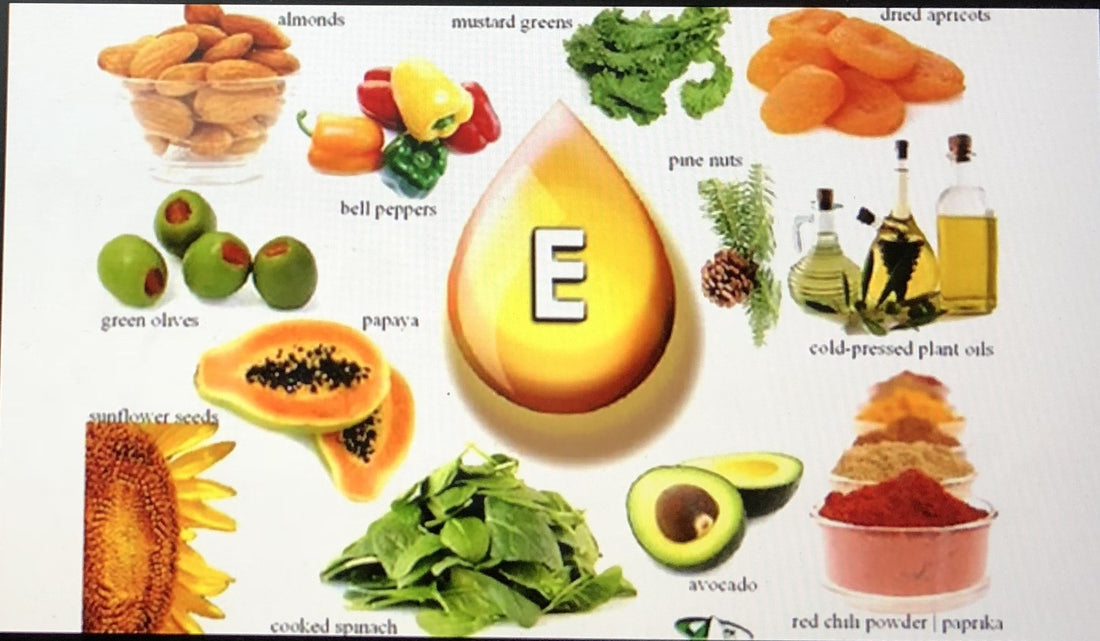Why We Use All Natural Vitamin E (as d-alpha tocopheryl succinate) at LookingVibrant.com?
Vitamin E is a must-take nutrient for your heart. The many benefits of Vitamin E is that it prevents oxidation of LDL bad cholesterol, helps thin the blood, stabilizes plaque and improves vascular tone. Plus, Vitamin E protects your lungs from environmental toxins, supports your vision and more.
When buying Vitamin E, avoid the "dl" synthetic form.
Cancer Cells are Highly Susceptible to Free Radicals
The emerging studies show that cancer cells that are able to protect themselves against reactive oxygen species (free radicals) are less likely to undergo apoptosis. Thus, some experimental studies show that antioxidant fortification via superoxide dismutase, N-acetylcysteine, coenzyme Q10, and possibly other forms of vitamin E, provide cancer cells with a survival advantage due to their antioxidant properties.
However, vitamin E succinate has the opposite effect – it increases the accumulation of free radicals within cancer cells, which leads to cell death. This has been shown to occur via the unique ability of vitamin E succinate’s capacity to bind to complex II within the mitochondria, thus preventing binding of coenzyme Q10 at this point in the mitochondrial chain. As such, coenzyme Q10 becomes unable to transfer electrons to complex II and thereby releases them within the cell. The unpaired electrons interact with cellular oxygen to form various reactive oxygen species, such as the superoxide anion (free radicals), which accumulate and trigger programmed cell death.
This mitochondrial disruption killing-effect of cancer cells has recently been demonstrated in a mouse model of breast cancer, in which many tumors showed over-expression the Her-2 receptor. The positive Her-2 receptor breast cancer phenotype is known to be highly aggressive and a stubborn form of cancer to kill.
Anticancer agents that target mitochondria disruption leading to programmed cell death are termed mitogens, which represent a new investigative and promising area of oncology research. Vitamin E succinate is one of the most promising mitogens discovered to date (14, 15).
In addition, vitamin E succinate has shown other multi-modal anticancer properties that have been reviewed by several researchers over the years (16, 17).
Human Studies Underway
The impressive experimental cancer-killing effects of vitamin E succinate, coupled with our understanding of its observed anticancer properties (particularly reactive oxygen species-induced apoptosis, and inhibiting the anti-apoptotic effects of Bcl-2 and Bcl-xl), prompted researchers to test vitamin E succinate in a recent human case of mesothelioma. Malignant mesothelioma is a form of lung cancer caused by exposure to asbestos and is highly resistant to radiation and chemotherapy. In this single case study administering vitamin E succinate to a patient with malignant mesothelioma, the researches stated, “the data revealed a significant clinical benefit with vitamin E succinate therapy, causing a reduction in tumor volume and improved the well-being of our subject who had a lethal type of neoplastic pathology”. This outcome was published in the Lancet in 2005. These researchers are currently preparing to set-up a larger clinical trial in which a cohort of mesothelioma patients will be treated with vitamin E succinate (14). Experimental studies in the past have demonstrated the efficacy of vitamin E succinate in killing human malignant mesothelioma cells in-vitro (15, 16).
My View Point
Due to the conflicting data surrounding the influence of vitamin E on cancer, it may be wise to choose multiple vitamins that contain vitamin E in the form of vitamin E succinate at a minimum dose of 400 IU for purposes of health promotion and possibly cancer prevention. Human oral supplementation studies using significant (supraphysiological) doses of vitamin E succinate have been shown to raise plasma levels of vitamin E succinate. This is unlikely to occur with low-dose intake, as the pancreatic digestive esterase enzymes typically deconjugate the succinate moiety from vitamin E succinate in the gut. In supraphysiological supplementation a significant percentage of the vitamin E succinate has been shown to get absorbed into the bloodstream intact (as vitamin E succinate), by-passing deconjugation by esterase enzymes in the gut. This is important because studies show that vitamin E succinate must reach cancer cells intact (in the form of vitamin E succinate) in order to exert its anticancer properties (17).
The next step is for researchers to begin using vitamin E succinate more aggressively in animal models of cancer prevention and treatment to determine its efficacy and best route of administration. From there, hopefully, we will see its adoption in a greater number of human cancer trials, in both prevention and adjunctive cancer treatment.
Most other skin care products (even expensive brands) use a synthetic form of alpha-tocopherol acetate. This has much lower antioxidant benefits compared with natural alpha-tocopherol and is not so effective. Even those skincare products that do use natural vitamin E, usually include it in very small amounts, mainly for marketing purposes.
In contrast, all our skincare products contain a high level (between 0.5% and 1%) of natural vitamin E. Most competing products contain only about one-fifth of that amount (0.1% to 0.2%).
Dr. Stephen Sinatra continues, Bottom Line on the Benefits of Vitamin E
Women should take 100 to 200 IU of Vitamin E and men should take at least 200 IU of natural d-alpha tocopherol form with mixed tocopherols.
You also want to take it with antioxidants, including 50 to 100 mg of CoQ10-ZC, 1000 to 2000 mg of vitamin C and/or 50 to 200 mcg of selenium, to enjoy the full benefits of Vitamin E.
References
-
Slatore CG, Littman AJ, Au DH, Satia JA, White E. Long-term use of supplemental multivitamins, vitamin C, vitamin E, and folate does not reduce the risk of lung cancer. Am J RespirCrit Care Med. 2008;177(5):524-530.
-
Heinonen OP, Albanes D, Virtamo J, et al. Prostate cancer and supplementation with α-tocopherol and β-carotene: incidence and mortality in a controlled trial. J Natl Cancer Inst. 1998;90(6):440-446.
Cheers to your health
Team-Lookingvibrant.com

